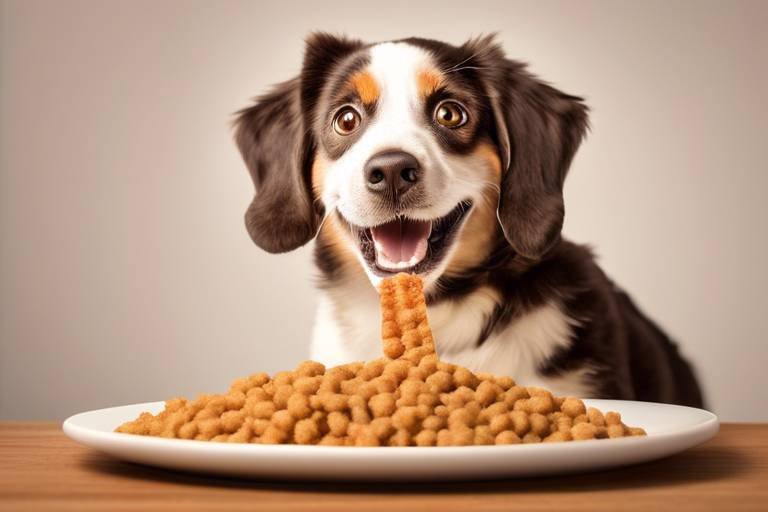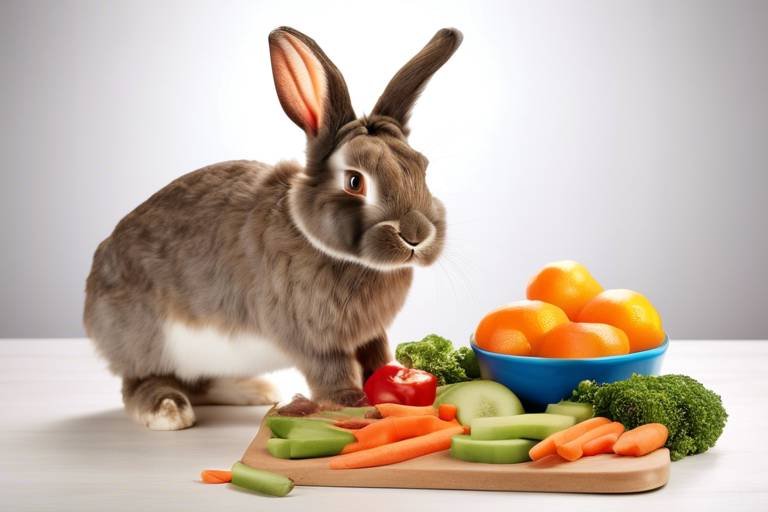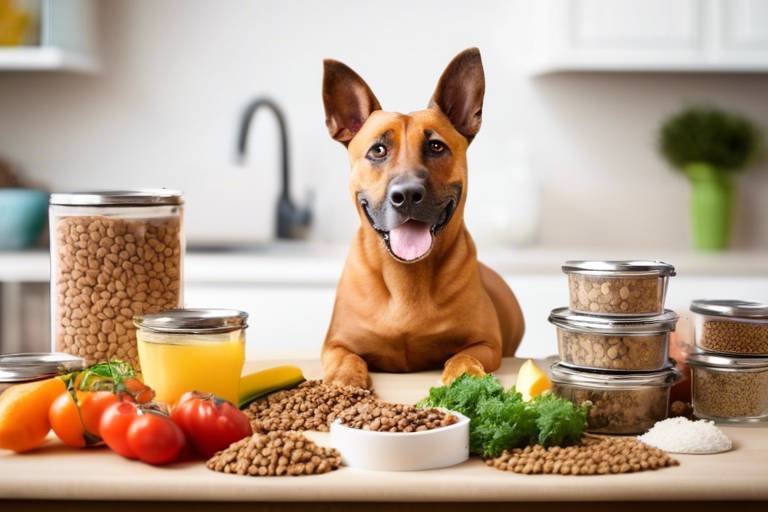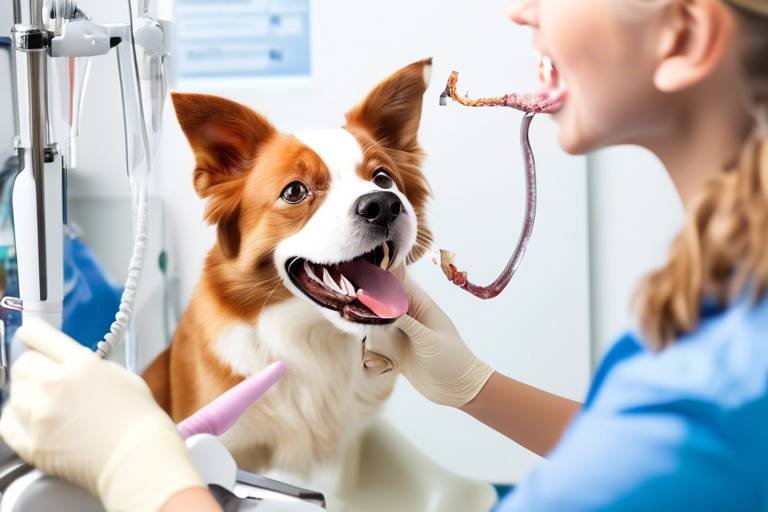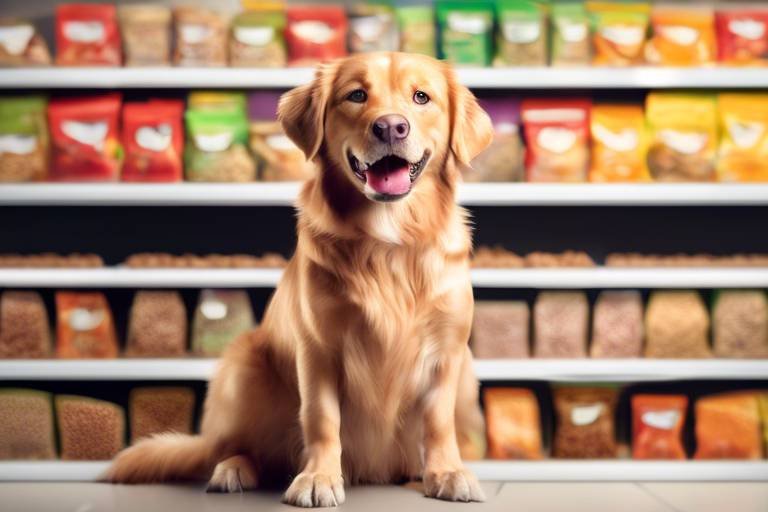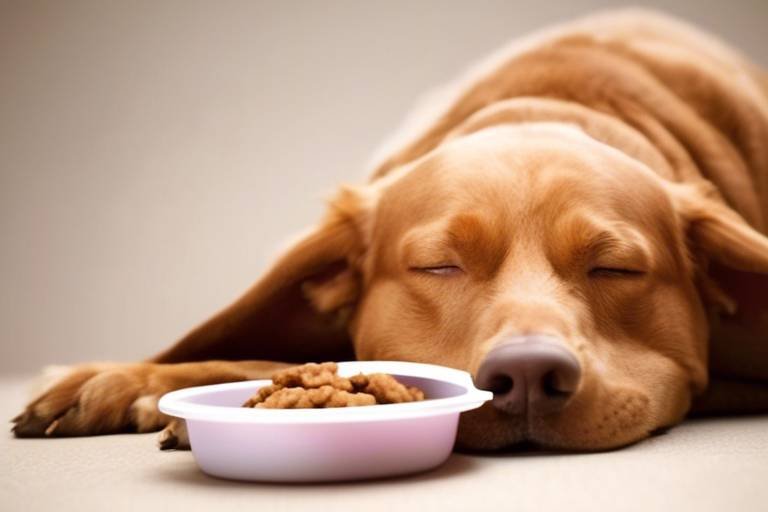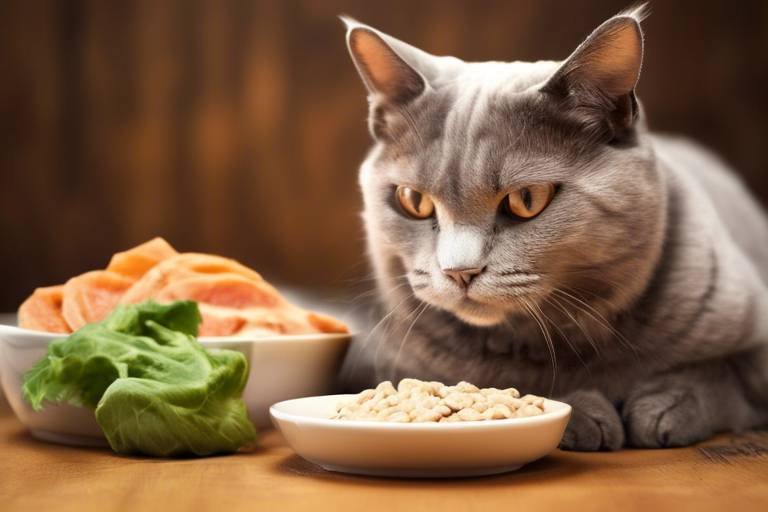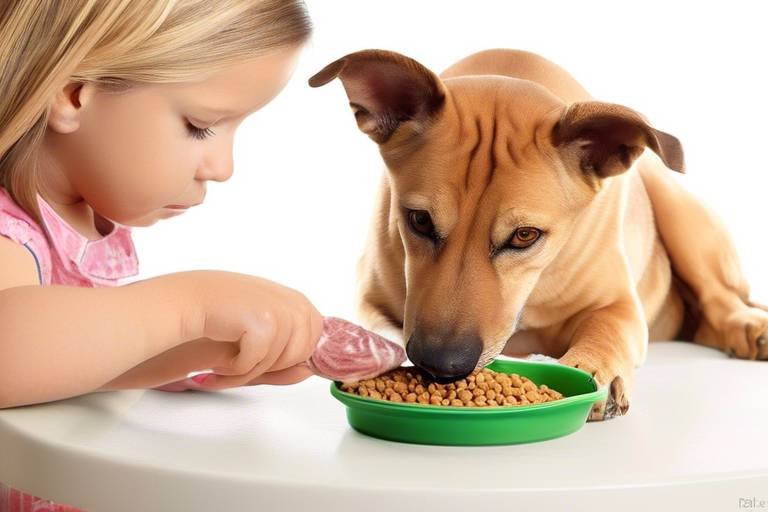The Role of Nutritional Yeast in Pet Health
Have you ever wondered how to boost your furry friend's health without resorting to complicated supplements? Well, meet nutritional yeast, a powerhouse ingredient that’s gaining popularity among pet owners. This deactivated yeast is not just a trendy food additive for humans; it’s packed with nutrients that can significantly benefit your pets. Imagine a sprinkle of magic that can enhance your pet's vitality, improve their coat, and even support their immune system. Sounds intriguing, right? In this article, we’ll dive into the world of nutritional yeast, exploring its nutritional profile, health benefits for both dogs and cats, and practical tips on incorporating it into their diets. By the end, you’ll see why this golden powder deserves a spot in your pet's food bowl!
Nutritional yeast is a deactivated form of yeast that’s rich in vitamins, minerals, and protein. Unlike baker’s yeast or brewer’s yeast, it doesn’t cause fermentation, making it safe and beneficial for pets. This unique yeast is loaded with essential nutrients, including Vitamin B complex, which plays a crucial role in energy metabolism and overall health. But what makes it truly special is its high content of beta-glucans, which are known to support the immune system. Think of nutritional yeast as a nutritional powerhouse that can help your pets thrive. It's not just a food additive; it's a health booster!
When it comes to our canine companions, nutritional yeast offers a treasure trove of health benefits. From improved digestion to a shiny coat, this superfood can play a pivotal role in your dog's well-being. Let’s break down some of the key advantages:
One of the standout benefits of nutritional yeast is its ability to promote a healthy gut microbiome in dogs. By incorporating this ingredient into their diet, you can help your furry friend maintain a balanced digestive system. The presence of dietary fiber in nutritional yeast aids in digestion and can prevent gastrointestinal issues, such as constipation and diarrhea. Imagine your dog's gut as a bustling city; nutritional yeast acts like a friendly traffic officer, ensuring everything runs smoothly.
Did you know that nutritional yeast acts as a prebiotic? This means it supports the growth of beneficial gut bacteria, which is essential for maintaining digestive balance in pets. A healthy gut flora can lead to improved nutrient absorption and overall wellness. So, just like a gardener nurtures plants, nutritional yeast nurtures your pet's gut health. It’s a win-win situation!
For some dogs, food allergies can be a significant concern. Nutritional yeast may help alleviate symptoms by providing essential nutrients without common allergens. It’s like finding a hidden treasure chest of nutrients that can help ease your pet’s discomfort. By adding this ingredient to their meals, you can support their immune system while minimizing the risk of allergic reactions.
A strong immune system is vital for your pet's health. Nutritional yeast can bolster immune function thanks to its high concentration of antioxidants and beta-glucans. These compounds work together to enhance your dog's natural defenses, helping them fend off illnesses and stay vibrant. Think of it as giving your dog a superhero cape, ready to take on the world!
It's not just dogs that can enjoy the perks of nutritional yeast; cats can also reap its rewards! This section highlights some specific benefits for feline health and wellness. After all, our feline friends deserve the best, don’t they?
Nutritional yeast is an excellent source of B vitamins, which are crucial for energy metabolism in cats. These vitamins help convert food into energy, keeping your kitty active and playful. Imagine your cat as a little engine; B vitamins are the fuel that keeps it running smoothly. Without them, your cat might feel sluggish and less enthusiastic about playtime.
A shiny coat is often a sign of good health in cats. Nutritional yeast contributes to skin and coat vitality by providing essential nutrients that promote a healthy, lustrous appearance. It’s like giving your cat a beauty treatment from the inside out! Regularly incorporating nutritional yeast into their diet can lead to a softer, shinier coat that you’ll love to pet.
- Is nutritional yeast safe for pets? Yes, nutritional yeast is safe for both dogs and cats when given in moderation.
- How much nutritional yeast should I give my pet? Start with a small amount, about 1/4 teaspoon for small pets and up to 1 tablespoon for larger pets, and adjust based on their needs.
- Can I use nutritional yeast as a replacement for other supplements? While it offers many benefits, it should complement a balanced diet rather than replace other necessary supplements.

Understanding Nutritional Yeast
Nutritional yeast is a unique ingredient that has gained popularity not just among health enthusiasts but also among pet owners looking to enhance their furry friends' diets. Unlike active yeast used in baking, nutritional yeast is a deactivated form that is packed with a wealth of nutrients. It comes in the form of yellow flakes or powder and boasts a cheesy, nutty flavor that many pets find irresistible. But what makes this superfood so valuable for our pets?
First and foremost, nutritional yeast is rich in a variety of vitamins and minerals. It is particularly known for its high content of B vitamins, including B1 (thiamine), B2 (riboflavin), B3 (niacin), B6 (pyridoxine), B9 (folate), and B12 (cobalamin). These vitamins play a crucial role in energy metabolism, supporting overall health and vitality in pets. In addition to B vitamins, nutritional yeast is also a good source of protein, containing all nine essential amino acids, making it a fantastic supplement for both dogs and cats.
Moreover, nutritional yeast is a powerhouse of antioxidants, which help combat oxidative stress in pets. This means that it can play a role in reducing inflammation and supporting a healthy immune system. The presence of beta-glucans in nutritional yeast also contributes to its immune-boosting properties, making it a beneficial addition to your pet's diet, especially during times of stress or illness.
In terms of its composition, nutritional yeast is low in calories and fat, making it an excellent choice for pets that might be overweight or prone to obesity. It can be sprinkled on food or mixed into homemade treats, providing a tasty and nutritious boost. But how do you ensure that your pet gets the most out of this supplement? Here’s a quick overview of its nutritional profile:
| Nutrient | Amount per 1 tablespoon (15g) |
|---|---|
| Calories | 60 |
| Protein | 8g |
| Vitamin B1 (Thiamine) | 0.3mg |
| Vitamin B2 (Riboflavin) | 0.3mg |
| Vitamin B3 (Niacin) | 2.4mg |
| Vitamin B6 (Pyridoxine) | 0.1mg |
| Vitamin B12 (Cobalamin) | 2.4mcg |
| Folate | 24mcg |
| Fiber | 4g |
Incorporating nutritional yeast into your pet's diet can be a simple yet effective way to enhance their health. Whether you sprinkle it on their food or mix it into homemade recipes, the benefits are numerous. Just remember to start with small amounts and observe how your pet responds. It's all about finding the right balance! So, why not give nutritional yeast a try and see how it can transform your pet's meals into a nourishing experience?

Health Benefits for Dogs
Nutritional yeast isn't just a trendy ingredient for human diets; it also brings a plethora of health benefits for our furry friends. When you think about it, dogs are much like us in that they require a balanced diet filled with essential nutrients to thrive. Incorporating nutritional yeast into their meals can be a game-changer. Imagine giving your dog a boost that not only enhances their overall health but also makes mealtime a little more exciting! Let's dive into the specific advantages of this superfood for dogs.
One of the standout benefits of nutritional yeast is its ability to promote a healthy gut microbiome in dogs. Just like humans, dogs can suffer from digestive issues that lead to discomfort and health problems. By incorporating nutritional yeast into their diet, you're essentially providing them with a natural remedy that aids digestion and helps prevent gastrointestinal issues. It’s like giving them a little digestive cheerleader! The high fiber content in nutritional yeast supports regular bowel movements and ensures that their gut is functioning optimally.
What makes nutritional yeast particularly interesting is its role as a prebiotic. This means it serves as food for the beneficial bacteria in your dog's gut. When these good bacteria thrive, they help maintain digestive balance, leading to a happier, healthier pup. Think of it as a nourishing feast for the tiny soldiers fighting off bad bacteria. This balance is crucial because it can help alleviate issues such as bloating, gas, and irregular stools. In essence, nutritional yeast is like the special ingredient that keeps your dog’s digestive system in tip-top shape!
Food allergies can be a real pain for pets, causing discomfort and distress. The good news is that nutritional yeast may help alleviate some of these symptoms. Packed with essential nutrients, it provides a nutritious alternative to common allergens found in many dog foods. By adding nutritional yeast to your dog's meals, you could be offering them a way to enjoy tasty food without the risk of triggering allergic reactions. It’s akin to finding a hidden treasure in their bowl—one that keeps them healthy and happy!
Just like us, dogs need a robust immune system to fend off illnesses. Nutritional yeast is a powerhouse of vitamins and minerals that can bolster immune function in dogs. With its rich content of B vitamins, protein, and antioxidants, nutritional yeast helps strengthen your dog’s defenses against infections and diseases. Imagine it as a shield, providing your furry companion with the resilience they need to stay healthy. Regular incorporation of this superfood into their diet can lead to fewer vet visits and a happier, more energetic dog!
Digestive Health Improvement
Nutritional yeast can be a game-changer for your dog's digestive health. Think of it as a superhero for their gut! When you sprinkle this golden, flaky goodness onto their food, you're not just adding flavor; you're also promoting a healthy gut microbiome. Just like humans, dogs need a balanced gut to thrive, and nutritional yeast plays a pivotal role in achieving that balance. It’s loaded with essential nutrients that help support the growth of beneficial bacteria in their digestive system.
One of the standout features of nutritional yeast is its prebiotic properties. Prebiotics are non-digestible food components that help beneficial gut bacteria flourish. By incorporating nutritional yeast into your dog's diet, you're essentially giving those good bacteria a feast! This can lead to improved digestion, better nutrient absorption, and a reduction in gastrointestinal issues. Imagine your dog's gut as a bustling city; nutritional yeast helps keep the roads clear and traffic flowing smoothly.
Moreover, many dogs suffer from digestive discomfort, which can manifest in various ways, such as bloating, gas, or irregular bowel movements. Nutritional yeast can help alleviate these symptoms by providing a rich source of dietary fiber. Fiber is crucial for maintaining a healthy digestive tract, as it promotes regular bowel movements and prevents constipation. It’s like a gentle broom sweeping through your dog’s intestines, ensuring everything stays clean and functioning properly.
In addition to fiber, nutritional yeast is packed with vitamins and minerals that support overall digestive health. For instance, it contains B vitamins, which are essential for energy metabolism and can help your dog feel more vibrant and active. When your pet's digestive system is functioning optimally, you’ll likely notice an increase in their energy levels and overall well-being. It’s a win-win!
Now, you might wonder how to introduce this beneficial ingredient into your dog's diet. It's quite simple! You can start by mixing a small amount of nutritional yeast into their regular food. Gradually increase the quantity to see how your dog responds. Most dogs love the cheesy flavor, making it an easy addition to their meals. Just remember to consult your veterinarian before making significant changes to your pet's diet, especially if they have pre-existing health conditions.
In summary, nutritional yeast is more than just a trendy addition to your pet's diet; it's a powerhouse of digestive health benefits. By enhancing gut microbiome balance, providing prebiotic support, and delivering essential nutrients, you can help your furry friend feel their best. So, why not give it a try? Your dog might just thank you with a wagging tail and a happy bark!
- Is nutritional yeast safe for all pets? Yes, nutritional yeast is generally safe for both dogs and cats. However, always consult your veterinarian before introducing new foods.
- How much nutritional yeast should I give my pet? Start with a small amount, about 1/4 teaspoon for small dogs and 1 teaspoon for larger dogs, and adjust as necessary.
- Can nutritional yeast help with my pet's allergies? Some pets may find relief from allergies by incorporating nutritional yeast, but it's essential to consult a vet for tailored advice.
- What are the signs that my pet is benefiting from nutritional yeast? Look for improvements in digestion, energy levels, and the condition of their coat.
Prebiotic Properties
Nutritional yeast is not just a tasty addition to your pet's meals; it also boasts impressive that can significantly enhance your pet's digestive health. But what exactly does that mean? Prebiotics are non-digestible food components that promote the growth of beneficial microorganisms in the intestines. In simpler terms, they’re like fertilizer for the good bacteria in your pet's gut. By incorporating nutritional yeast into your furry friend’s diet, you’re essentially giving those beneficial bacteria a boost, which can lead to improved digestion and overall gut health.
One of the key benefits of nutritional yeast is its ability to support a balanced gut microbiome. A healthy microbiome is crucial for digestion, as it helps break down food and absorb nutrients more efficiently. Imagine your pet's gut as a bustling city; the good bacteria are the workers keeping everything running smoothly, while the bad bacteria are the troublemakers causing chaos. Nutritional yeast helps tip the scale in favor of the good guys, ensuring your pet’s digestive system operates like a well-oiled machine.
Furthermore, the prebiotic properties of nutritional yeast can help prevent gastrointestinal issues such as diarrhea and constipation. When your pet’s gut flora is in balance, they are less likely to experience these uncomfortable problems. This is especially important for pets that may have sensitive stomachs or are prone to digestive disturbances. By adding nutritional yeast to their diet, you’re providing a natural way to maintain digestive harmony.
To give you a clearer picture of how nutritional yeast functions as a prebiotic, here’s a quick breakdown of its components:
| Component | Benefit |
|---|---|
| Beta-glucans | Enhances immune function and supports gut health |
| Polysaccharides | Promotes the growth of beneficial gut bacteria |
| Vitamins and Minerals | Supports overall health and aids in digestion |
In conclusion, incorporating nutritional yeast into your pet's diet can have a profound impact on their digestive health due to its prebiotic properties. Not only does it help maintain a healthy gut microbiome, but it also aids in preventing gastrointestinal issues. So, the next time you're looking for a way to enhance your pet's meals, consider sprinkling some nutritional yeast on top. It's a simple addition that can lead to big benefits!
- Can I give nutritional yeast to my pet every day? Yes, in moderation, nutritional yeast can be a daily supplement to your pet's diet.
- Is nutritional yeast safe for all pets? While generally safe, it's best to consult your veterinarian, especially if your pet has specific dietary restrictions.
- How should I incorporate nutritional yeast into my pet's food? You can sprinkle it on their regular food or mix it into homemade meals.
Reducing Allergies
When it comes to our furry friends, allergies can be a real pain in the neck. Just like humans, pets can suffer from a variety of allergies, whether they're environmental, food-related, or even seasonal. This is where nutritional yeast shines as a potential ally in alleviating those pesky symptoms. By incorporating nutritional yeast into your pet's diet, you can provide them with a rich source of essential nutrients without the common allergens that often trigger reactions.
One of the standout features of nutritional yeast is its ability to offer a unique blend of vitamins and minerals that support overall health. For pets with food allergies, finding a safe and nutritious food source can be challenging. Nutritional yeast is not only gluten-free but also free from many common allergens, making it an excellent addition to meals for sensitive pets. It’s like finding a hidden gem in a treasure hunt!
Moreover, nutritional yeast is packed with beta-glucans, which are known for their immune-boosting properties. These compounds can help modulate the immune system, potentially reducing the severity of allergic reactions. Imagine your pet's immune system as a well-trained army; nutritional yeast equips this army with the right tools to fight off invaders, including allergens.
Additionally, the presence of vitamin B complex in nutritional yeast plays a crucial role in skin health. A healthy skin barrier can significantly reduce the likelihood of allergens penetrating and causing irritation. By promoting skin vitality, nutritional yeast helps keep your pet’s skin resilient and less prone to allergic reactions. It's like giving your pet a protective shield against the elements!
To incorporate nutritional yeast into your pet's diet, consider mixing a small amount into their regular food. Start with about a teaspoon for smaller pets and up to a tablespoon for larger dogs. Always consult with your veterinarian before making any dietary changes, especially if your pet has known allergies. This way, you can ensure that you're not only helping them feel better but also keeping their overall health in check.
In summary, nutritional yeast can be a game-changer for pets suffering from allergies. With its rich nutrient profile, immune-boosting properties, and skin health support, it offers a natural way to help alleviate symptoms and improve your pet's quality of life. Just think of it as a sprinkle of magic in their food that can make a world of difference!
Enhanced Immune Support
When it comes to our furry friends, a robust immune system is like a superhero cape, protecting them from a myriad of health issues. Nutritional yeast steps into this role with remarkable finesse, offering a plethora of nutrients that can significantly bolster your dog's immune function. Just think of it as a natural shield, fortifying your pet's defenses against the everyday challenges they face, from pesky parasites to seasonal allergies.
Nutritional yeast is packed with essential vitamins and minerals, particularly the B vitamins, which play a crucial role in maintaining a healthy immune system. These vitamins are not just any ordinary nutrients; they are the building blocks that help your dog’s body produce energy and support cellular function. For instance, Vitamin B6 is vital for the production of antibodies, which are essential for fighting off infections and diseases. By incorporating nutritional yeast into your dog's diet, you’re essentially giving them a boost of energy while also enhancing their body's ability to fend off illnesses.
Moreover, the presence of antioxidants in nutritional yeast can help combat oxidative stress in your dog's body. Oxidative stress occurs when there’s an imbalance between free radicals and antioxidants, leading to cellular damage. Think of antioxidants as tiny warriors, battling the harmful effects of free radicals that can compromise your pet's immune system. With nutritional yeast, you're equipping your dog with these warriors, promoting not just a stronger immune response, but also overall health and vitality.
It's also worth noting that nutritional yeast contains beta-glucans, which are powerful compounds known to stimulate immune function. These beta-glucans act like a wake-up call for your dog’s immune cells, prompting them to become more active and efficient in their response to threats. This means that your dog’s body is more prepared to tackle infections and other health challenges head-on.
Incorporating nutritional yeast into your dog's diet can be as simple as sprinkling it over their food. You can start with a small amount, gradually increasing it to ensure your dog enjoys the taste while reaping the health benefits. Just remember, moderation is key! A little sprinkle can go a long way in enhancing your dog's immune support.
So, if you're looking for a way to boost your dog's immune health naturally, nutritional yeast might just be the superhero ingredient you need. It's not only beneficial but also a tasty addition to their meals, making it a win-win for both you and your furry companion.
- What is nutritional yeast? Nutritional yeast is a deactivated form of yeast that is rich in vitamins, especially B vitamins, and minerals.
- Can I give nutritional yeast to my dog every day? Yes, you can incorporate it into your dog's diet daily, but start with small amounts to see how they react.
- Are there any side effects of nutritional yeast for pets? Generally, it is safe, but some pets may have sensitivities. Always consult your vet before introducing new foods.
- How can I add nutritional yeast to my pet's diet? You can sprinkle it on their food or mix it into homemade meals for added flavor and nutrition.

Benefits for Cats
Nutritional yeast isn't just a trendy topping for human dishes; it’s a powerhouse of nutrition that can significantly benefit our feline friends. Cats, being obligate carnivores, have specific dietary needs, and incorporating nutritional yeast into their meals can provide essential nutrients that support their overall health. One of the standout features of nutritional yeast is its rich content of B vitamins, which play a crucial role in energy metabolism, helping cats to maintain their vitality and enthusiasm for life. Just imagine your cat, full of energy, chasing after their favorite toy, all thanks to the nutritional boost!
Moreover, the benefits of nutritional yeast extend beyond just energy. It is also instrumental in promoting skin and coat health. A shiny, lustrous coat is often a reflection of a cat's overall well-being, and nutritional yeast contributes to that by providing essential amino acids and fatty acids. These nutrients not only nourish the skin but also help to reduce dryness and flakiness, ensuring that your cat's fur is as radiant as their personality. Picture your cat basking in the sunlight, their coat glistening like a well-polished gem—this is the kind of transformation nutritional yeast can help achieve!
In addition to these benefits, nutritional yeast can also play a role in keeping your cat's immune system robust. A strong immune system is vital for warding off infections and diseases, and the antioxidants found in nutritional yeast can help bolster your cat's defenses. With a diet enriched with these nutrients, your feline companion is likely to enjoy a longer, healthier life, filled with playful moments and fewer trips to the vet.
To sum it up, here are some of the key benefits of nutritional yeast for cats:
- Rich Source of B Vitamins: Essential for energy metabolism and overall vitality.
- Supports Skin and Coat Health: Contributes to a shiny, healthy coat and reduces skin issues.
- Boosts Immune Function: Helps strengthen the immune system against illnesses.
Incorporating nutritional yeast into your cat's diet can be as simple as sprinkling a small amount on their food. Just remember, moderation is key! Start with a pinch and observe how your cat responds. If they seem to enjoy it and have no adverse reactions, you can gradually increase the amount. It's a delightful way to treat your cat while ensuring they receive the nutrients they need to thrive. So, why not give it a try? Your furry friend might just thank you with extra purrs and playful antics!
Q: Can all cats eat nutritional yeast?
A: Most cats can safely consume nutritional yeast, but it's always best to consult with your veterinarian before making any significant changes to their diet.
Q: How much nutritional yeast should I give my cat?
A: Start with a small amount, such as a pinch, and observe your cat's reaction. You can gradually increase the amount if they enjoy it and have no negative effects.
Q: Are there any side effects of nutritional yeast for cats?
A: While nutritional yeast is generally safe, some cats may be sensitive to it. Monitor your cat for any signs of digestive upset or allergies.
Q: Can nutritional yeast help with my cat's allergies?
A: Nutritional yeast may help alleviate some allergy symptoms due to its nutrient content, but it should not replace veterinary advice for managing allergies.
Vitamin B Complex
Nutritional yeast is often hailed as a superfood for pets, particularly for our feline friends. One of the standout features of this deactivated yeast is its impressive content. These vitamins play a crucial role in various bodily functions, making them essential for your cat's overall health. Just like how we need a balanced diet to thrive, our cats also benefit immensely from these vital nutrients.
So, what exactly is the Vitamin B complex? It consists of several B vitamins, including B1 (thiamine), B2 (riboflavin), B3 (niacin), B5 (pantothenic acid), B6 (pyridoxine), B7 (biotin), B9 (folate), and B12 (cobalamin). Each of these vitamins contributes uniquely to your cat's well-being. For instance, B vitamins are essential for energy metabolism, helping convert food into the energy your cat needs to play, explore, and just be their adorable selves.
Incorporating nutritional yeast into your cat's diet can help ensure they receive an adequate supply of these vital nutrients. Not only does it support energy levels, but it also aids in maintaining a healthy nervous system, which is crucial for your cat's overall functionality. Imagine your cat as a finely tuned engine; without the right fuel, it simply won't run smoothly. That's where the B vitamins come into play!
Furthermore, B vitamins are known to promote healthy skin and a shiny coat. Many pet owners notice that their cats' fur becomes more lustrous and less prone to shedding when they include nutritional yeast in their diet. This is because B vitamins contribute to the production of keratin, a key protein in your cat's skin and coat. It’s like giving your cat a spa day from the inside out!
To give you a clearer picture, here’s a quick breakdown of how different B vitamins benefit your cat:
| Vitamin | Benefits |
|---|---|
| B1 (Thiamine) | Supports energy metabolism and nervous system health. |
| B2 (Riboflavin) | Helps in energy production and maintaining healthy skin. |
| B3 (Niacin) | Essential for DNA repair and skin health. |
| B6 (Pyridoxine) | Involved in protein metabolism and cognitive development. |
| B12 (Cobalamin) | Crucial for red blood cell production and neurological function. |
In conclusion, adding nutritional yeast to your cat's diet can be a game-changer. Not only does it provide a wealth of B vitamins that support energy and skin health, but it also enhances their overall vitality. Just remember, when it comes to your pet's health, a little sprinkle of nutritional yeast can go a long way!
- Can I give my cat too much nutritional yeast? It's important to introduce any new supplement gradually and consult your veterinarian for appropriate dosages.
- Is nutritional yeast safe for all pets? Generally, yes! However, always check with your vet, especially if your pet has specific dietary needs.
- How can I incorporate nutritional yeast into my cat's diet? You can sprinkle it on their regular food or mix it into homemade meals for added flavor and nutrition.
Skin and Coat Health
When it comes to our furry friends, is often a top priority for pet owners. After all, a shiny, healthy coat is not just a sign of good grooming; it’s a reflection of overall wellness. One of the unsung heroes in promoting this vitality is nutritional yeast. This deactivated yeast is packed with essential nutrients that can significantly enhance your pet's skin and coat condition. But how does it work its magic?
Nutritional yeast is loaded with B vitamins, particularly B1 (thiamine), B2 (riboflavin), B3 (niacin), B5 (pantothenic acid), B6 (pyridoxine), B7 (biotin), B9 (folate), and B12 (cobalamin). These vitamins play a crucial role in maintaining healthy skin and fur. For instance, biotin is known for its ability to strengthen hair and promote growth, while riboflavin helps in the production of red blood cells, which in turn nourishes the skin. This means that when your pet consumes nutritional yeast, they’re not just getting a snack; they’re receiving a powerful boost for their skin and coat.
Moreover, the protein content in nutritional yeast is another factor that contributes to a healthy coat. Proteins are the building blocks of hair, and a diet rich in quality protein can lead to a more lustrous and resilient fur. Additionally, the amino acids present in nutritional yeast aid in the repair of skin tissues, making it a fantastic option for pets with dry or flaky skin.
But wait, there's more! Nutritional yeast also contains important antioxidants that combat free radicals, which can lead to skin damage and premature aging. By incorporating this superfood into your pet’s diet, you’re not just addressing current skin issues; you’re also helping to prevent future ones. This dual action is essential for maintaining a vibrant coat and healthy skin.
Now, you might be wondering how to introduce this nutritional powerhouse into your pet's meals. It's quite simple! Nutritional yeast has a cheesy flavor that many pets find irresistible. You can sprinkle it over their food or mix it into homemade treats. Here’s a quick guide on how to incorporate it:
| Method | Description |
|---|---|
| Sprinkling | Just sprinkle a small amount over your pet's regular food. Start with a teaspoon and adjust according to their preference. |
| Mixing | Mix it into homemade treats or wet food for a tasty boost. |
| Cooking | Add it to cooked meals or snacks, ensuring it's not exposed to high heat for long periods to retain its nutrients. |
In conclusion, nutritional yeast is not just a trendy addition to your pet's diet; it’s a powerhouse of nutrients that can significantly improve skin and coat health. By providing essential vitamins, proteins, and antioxidants, it helps ensure your pet looks and feels their best. So why not give it a try? Your pet's shiny coat will thank you!
- Can all pets consume nutritional yeast? - Most pets can safely consume nutritional yeast, but it's always best to consult with your veterinarian first.
- How much nutritional yeast should I give my pet? - Start with a small amount, such as a teaspoon for dogs and a pinch for cats, and adjust based on their size and dietary needs.
- Are there any side effects? - Generally, nutritional yeast is safe, but some pets may experience digestive upset. Monitor your pet after introducing it to their diet.
Frequently Asked Questions
- What is nutritional yeast?
Nutritional yeast is a deactivated form of yeast that is packed with essential vitamins and minerals. It's often used as a dietary supplement for both humans and pets due to its rich nutrient profile, including B vitamins and protein.
- Can I give nutritional yeast to my dog?
Absolutely! Nutritional yeast can be a great addition to your dog's diet. It supports digestive health, boosts the immune system, and promotes a shiny coat. Just be sure to introduce it gradually and in moderation.
- How does nutritional yeast improve digestive health in pets?
Nutritional yeast acts as a prebiotic, which means it helps nourish the beneficial bacteria in your pet's gut. This can lead to improved digestion and a healthier gut microbiome, reducing gastrointestinal issues.
- Is nutritional yeast safe for cats?
Yes, nutritional yeast is safe for cats and can provide various health benefits. It is particularly rich in B vitamins, which are essential for energy metabolism and overall feline health.
- Can nutritional yeast help with pet allergies?
Yes, it can! Nutritional yeast is often well-tolerated by pets with food allergies since it provides essential nutrients without common allergens. It may help alleviate some allergy symptoms, but always consult your vet first.
- How can I incorporate nutritional yeast into my pet's diet?
You can sprinkle nutritional yeast on your pet's food or mix it into their meals. Start with a small amount to see how they react, and gradually increase it as needed. Your pets will likely enjoy the cheesy flavor!
- What are the signs that my pet might need nutritional yeast?
If your pet has a dull coat, digestive issues, or seems to lack energy, they might benefit from nutritional yeast. However, it's best to consult with your veterinarian to determine if it’s the right addition to their diet.
- How much nutritional yeast should I give my pet?
The amount can vary based on your pet's size and dietary needs. A general guideline is to start with about 1/4 teaspoon for small pets and up to 1 tablespoon for larger dogs. Always consult your vet for personalized advice.


